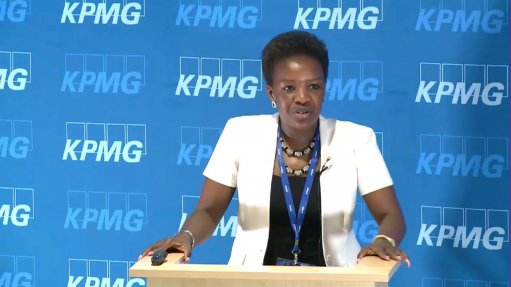
Business Leadership South Africa CEO Busi Mavuso
Realistically, South Africa will not see meaningful gross domestic product (GDP) growth within the next five years, Citadel Investment Services advisory partner and chief economist Maarten Ackerman has said.
He spoke alongside Business Leadership South Africa CEO Busi Mavuso during a post-Budget event hosted by auditors KPMG on February 23.
Both Mavuso and Ackerman lauded Finance Minister Enoch Godongwana for delivering a “solid and sensible” national Budget on February 22.
However, Ackerman argued that government may be too optimistic about the economic growth trajectory of South Africa, in anticipating a GDP growth rate of 0.9% in 2023, compared with the South African Reserve Bank’s estimate of 0.3%.
He also doubted that Eskom would be fully “fixed” in three years’ time, whereas Mavuso questioned what “fixed” meant, as both Godongwana and Mineral Resources and Energy Minister Gwede Mantashe have claimed that Eskom’s main problems could be fixed within a certain span of time.
As South Africa experiences more headwinds than tailwinds compared with prior years, including a slowdown in what had been a commodity boom, particularly in the mining sector, in 2020 and 2021, the business sector expects government to create an enabling environment for growth and investment now more than ever.
Ackerman said some other headwinds include the global economic slowing down, South Africa’s ports efficiency continuing to weaken and massive unemployment remaining unsolved. The rand is also set to weaken to more than R19 against the dollar, if South Africa is greylisted.
The nation is awaiting the outcome of intergovernmental body Financial Action Task Force’s meeting, which is meant to determine if South Africa has done enough to address deficiencies in its legal framework and the effectiveness of its implementation to prevent money laundering, terrorist financing and proliferation of financing of weapons of mass destruction.
Mavuso said that, should South Africa be greylisted, trade partners such as the UK may well refuse to do business with South Africa.
Meanwhile, she praised government for trying to improve the economic trajectory of the country and taking action to resolve the energy crisis; however, Mavuso said she could not overlook the fact that South Africa was becoming a “mafia State”, in that government is tied with organised crime.
For example, Mavuso said Eskom was sitting with a CEO that had been ousted and targeted. André de Ruyter was “removed with immediate effect” after he implicated senior politicians of the ruling party in alleged corruption that is exacerbating the country’s energy crisis. De Ruyter was only due to step down at the end of March.
This followed De Ruyter surviving what is believed to be an attempt to kill him with cyanide poisoning in December.
Mavuso said “we cannot expect the same people who got Eskom into this mess” to solve it and that spending money in a rotten environment would only serve to waste it. She called for a “reset button” of sorts, not only regarding the capability of Eskom to turn itself around but also for the State to become functional and have skilled people in leadership positions.
“Never mind grand plans that are never going to get delivered, can we focus on rebuilding network industries and curbing crime and corruption?” she proposed.
Nonetheless, she said business was committed to help government in its relief efforts, particularly with regard to an energy crisis response plan by President Cyril Ramaphosa’s National Energy Crisis Committee.
Although Mavuso welcomed some of government’s incentives to businesses, she questioned how effective they could be if the business environment remained unconducive to investment, and political will and State capability still stood in the way of development.
Mavuso hoped that government would soon review the necessity of having 243 State-owned entities, particularly as most of them are dysfunctional and since many functions can be incorporated into existing Ministries.
Ackerman concluded that South Africa’s tailwinds in recent years were fading fast, giving way to a dire economic and fiscal outlook, however, it is in “bad times” that countries are forced to find solutions.